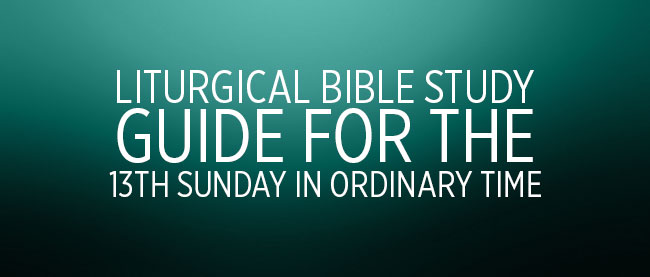1st Reading – 2 Kings 4:8-11, 14-16a
Second Kings deals mainly with the wars between Judah and Israel and the attacks on them from outside. The situation became even more critical when the Assyrians invaded, first in the 9th century B.C. and more vigorously in the 8th. Samaria, the capital of the Northern Kingdom (Israel), fell in 721, and later Judah became an Assyrian vassal.
After the assumption of Elijah on Mount Carmel (2 Kings 2:11) Elisha the prophet takes over the role of promoting the covenant.
Our reading today is the second of a complex of ten stories about Elisha. These stories alternate between the prophet’s dealings with his own people and his interactions with Gentiles. Each of the stories evidences such hallmarks of “legend” as the tendency to avoid naming characters (other than Elisha himself) and the intention of evoking wonderment at the hero’s powers. I am inclined to believe that the stories are not Alegends@ in the sense that they are not real, but in fact are true depictions of events in Elisha’s life. After all, he was a prophet of God Most High and what he did in God’s name would in fact evoke wonderment in the eyes of those who came in contact with him. I am reminded of a statement in Peter Kreeft’s book The God Who Loves You: “Prophets are like fingers, not faces. We are not meant to look at them but to the reality to which they point.”
2nd Reading – Romans 6:3-4, 8-11
Last week in our second reading we discussed three ages: Adam to Moses which is the natural period represented by the fallen, unhappy family; Moses to Christ which is the legal period in which one nation is the example; and from Christ onward which is the period of international blessing where all nations are blessed and freed from the Law
through the grace of Christ.
From Adam to Moses, the source of “death” was Adam’s sin. Human beings did, of course, commit evil, but they were not charged with it (sin is not taken into account where there is no Law). From Moses to Christ, the Law was added and human sin was understood as a transgression of it so now, in addition to Adam’s sin, individual transgressions are also taken into account because the Law existed. In the third period, that of Christ, there is freedom from the Law through the grace of Christ. This third period is described more fully beginning in Romans 10:4. In our reading today, Saint Paul describes the new life, the life in Christ, which we receive in baptism. To better understand the context, we will begin to read in Romans 5:20 and proceed through 6:14 but confine our study to the reading itself.
Gospel – Matthew 10:37-42
Two weeks ago we heard Jesus commission the twelve apostles and last week we heard some of His instructions to them. This week we hear the conclusion of His instructions.


